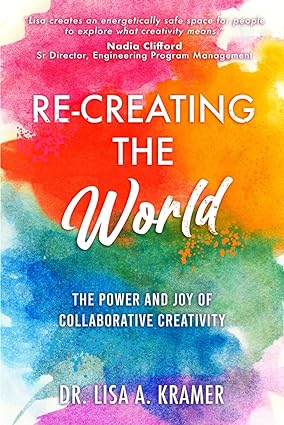Gateless: The Power of Positive Feedback
We have been raised to believe that criticism is the only way to learn and grow.
It occurs everywhere. Red marks on school papers. Annual reviews. Critical analysis of books, plays, artwork--anything we produce that can be judged by others. Criticism comes from outside sources, but also from that voice in your own head telling you that your work will never live up to some supreme ideal.
Some people thrive on criticism, becoming more and more determined to prove everyone wrong. Many shrivel up and freeze--thinking "if I can't do it right, if I can't be perfect, than I'm not good enough. I should just stop."
What would happen if we approached feedback with a different mentality? What would happen if we focused on people's strengths and successes, rather than weaknesses and failures?
From my experience, people would learn, grow, take more risks, be more creative, and thrive.
I recognize that there are times when being critical--or at least offering constructive criticism--might be necessary. However, I would argue that if you are trying to build confidence, strengthen collaboration, inspire new ideas, encourage learning and growth, and/or build community, there is a better approach.
The Marriage of Science and Ancient Zen
I was honored recently to become a certified instructor of Gateless Writing--a methodology created and taught by author/editor Suzanne Kingsbury. She explains:
"Gateless Writing is a methodology that uses creative brain science, ancient Zen, and highly-effective craft tools + resources to move you beyond the conditioned, critical mind to a place of limitless creative potential."
Suzanne Kingsbury http://suzannekingsbury.net/for-writers-only/gateless-writing/
Basically, the Gateless approach to writing frees us from the instinctive fight or flight reaction that we all feel when put in stressful situations. Criticism causes stress.
The Gateless methodology creates a safe place where you can explore and receive positive feedback that celebrates the work. It also separates (in some ways) the work from the person behind it, allowing the participants to bypass a stress reaction.

Lowering Norepinephrine
Norepinephrine is a stress hormone that is connected with depression, anxiety, PTSD, panic attacks, and elevated blood pressure. It is a naturally occurring hormone and neurotransmitter produced in the adrenal glands.
In stressful situations, norepinephrine increases as part of the fight or flight response to mobilize the brain and body for action.
https://www.hormone.org/your-health-and-hormones/glands-and-hormones-a-to-z/hormones/norepinephrine
Evidence shows that creative acts help lower norepinephrine--this allows for more creative acts as we release fear and explore new possibilities.
The observations that [Creative Innovation] often occurs during levels of low arousal and that many people with depression are creative suggests that alterations of neurotransmitters such as norepinephrine might be important in CI.
Heilman, Kenneth M. , Stephen E. Nadeau, and David Q. Beversdorf. “Creative Innovation, Possible Brain Mechanisms .” Neurocase, November 2003, https://hbr.org/2008/10/creativity-and-the-role-of-the-leader. Accessed 3 March 2021.
If we live in fear of criticism, however, that fear can simply take over, making it even more difficult to create, innovate, or explore solutions and new approaches. Using the Gateless methodology in a writing workshop allows for a safe container where people explore, through words, and discover their own voices.
It's truly amazing to watch this in action. Participants find paths to sharing stories that have held them back for years, and through that discover the freedom of letting go. Writers expand their craft, simply by listening to the craft and words of other participants, and celebrating what is already working in their own writing. Shy people share their work.
Every day, in every salon or workshop, I witness the growth of amazing voices
Beyond Writing
Here's the exciting thing--this doesn't just apply to writing.
Before I ever even learned about Gateless, I recognized the power of positive feedback in my theatre classrooms and workshops. Most of my students were not from the world of theatre. I often ran into people so terrified of performing, or speaking in front of anyone, that I wondered how I could have them succeed in class.
Exercise by exercise, reinforced with positive feedback that focused on what they did well, always worked. By the end of a workshop or a semester, even the most terrified had found a way to create, to perform, to speak.
Positive feedback provided in a way where everyone learns and grows, benefits any place where you want people to think or create. This includes the workplace.
For example:
"Perhaps the simplest advantage of positive reinforcement is that it directly encourages behaviors that a manager or business owner wants employees to repeat. Employees often suffer under a haze of uncertainty about the exact expectations of a given position. Negative feedback only clarifies what behaviors do not go with a job. By singling out the good behaviors, it sends a direct message to an employee that a given behavior falls exactly within the parameters of that employee's job, which informs future decisions the employee will make regarding behavior."
Dotigny, Eric. "The Advantages of Positive Feedback." Small Business Chronicle https://smallbusiness.chron.com/deal-immature-employee-17590.html Accessed. 30 March 2021.
Criticism has its place. Or does it?
The truth is that we can accomplish so much more by celebrating what we do well, and learning and growing in a creative, collaborative environment. All it truly requires is a willingness to take risks, be open and honest, and listen and learn form other people.
If you are interested in learning more about how this approach can enhance your work or you community, feel free to connect with me, or try out one of my salons. All of my upcoming events can be found here.
Of course, I'm always happy to start a conversation in the comments. What are your thoughts on letting go of criticism?
